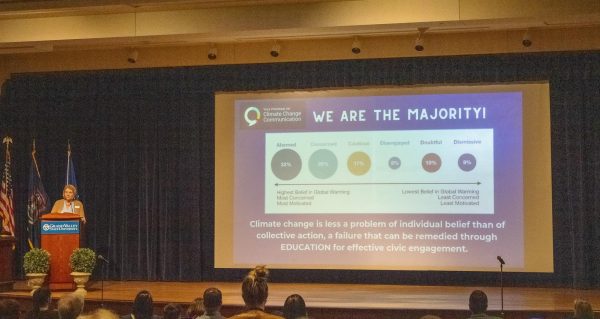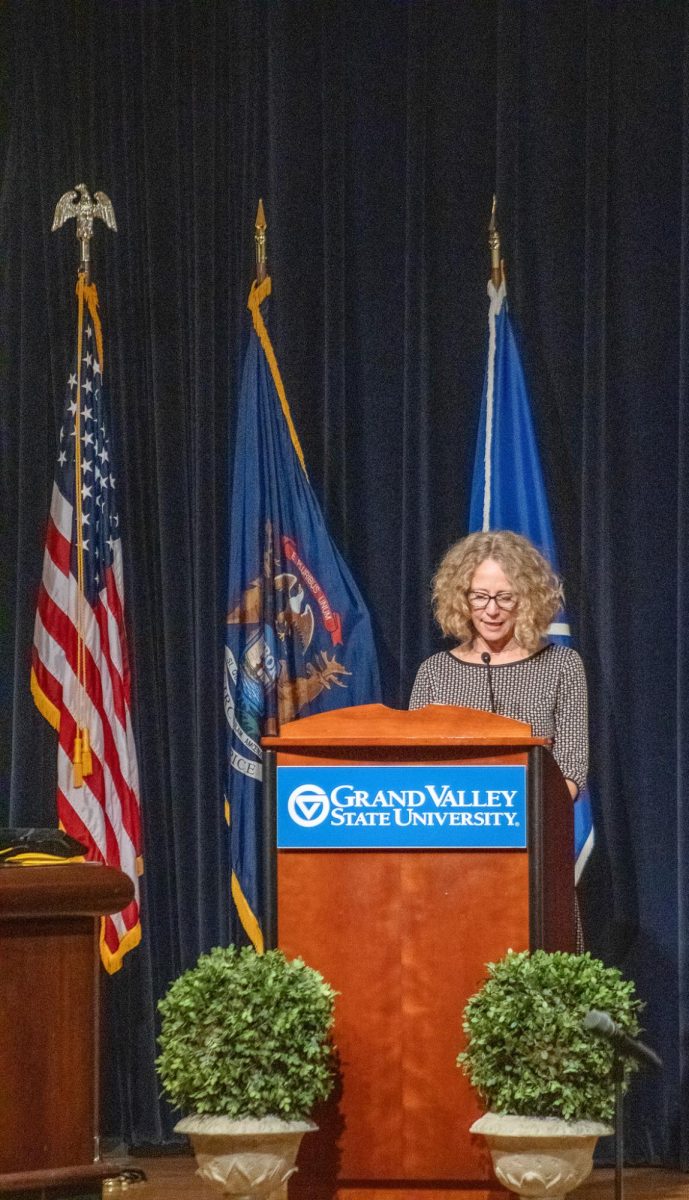Grand Valley State University held its fifth annual Climate Change Education Solutions Summit (CCESS) 2023 titled “Connecting Minds for a Sustainable Climate Future” on Oct. 17 and 18. The discussions centered around the many implications of climate change, including the social and political factors in play.
The climate summit had in-person events with a smaller capacity on the first day and a webinar presentation and panel discussion on the second. Hundreds of environmental educators, students, sustainability professionals and climate activists attended and participated in this event.
The CCESS panel, held on the second day of the summit, discussed racial capitalism, climate change, COVID-19 and public health. The panel featured keynote presenters Whitney L. Pirtle, Associate Professor of Sociology at the University of California, Merced, and John Biewen, Director of Storytelling and Public Engagement at the Kenan Institute for Ethics at Duke University. The panel was moderated by language and literature professor Brian Deyo of the GVSU Department of English.
Pirtle said in the discussion she discovered capitalism and race radicalization contribute to how climate change is approached.
“I came to learn about racial capitalism through engaging more deeply with black radical thought traditions. What I’ve learned is that the concept comes out of these sorts of thinkers, both in the U.S. and South Africa and global communities all over that were trying to think about how capital accumulation had been expanding, expanding, expanding, but how it is tied to the idea of race racialization and racism,” Pirtle said.
Prittle mentioned the 1983 publication “Black Marxism” by theorist and author Cedric Robinson as a reference on the subject. She said the systems of racial capitalism are conjoined in their impact on equity and accessibility.
“In general, racial capitalism is a concept that is the idea that capital accumulation is based on racial exploitation,” Pirtle said. “And that you cannot really see these two systems as distinct; they are linked together. So twin systems, this sort of divide and conquer, allow some people to thrive and some people to really struggle to survive.”
Quoting Robinson’s theories in “Black Marxism” Pirtle explained the development organization and expansion of a capitalist society pursued essentially racial directions, as did the social ideology.
“This theory says that racial capitalism created the modern world system. There’s slavery, colonialism and genocide, and in the United States, clearly, slavery shaped how we might think about racial capitalism today,” Pritle said. “The idea that some human beings were sought only for their labor, and not really to have any human value, and that allowed some to accumulate a lot and some to have a historical legacy of disadvantage and dispossession.”
Biewen said his research has shown neoliberalism is “individual liberty at the expense of the common good.” He has done work on democracy and white supremacy as well as connecting with “leading thinkers on neoliberalism.”
“My understanding basically is it’s (racial capitalism) a political philosophy that favors free market economics, so less government regulation of the economy, certainly and small government in general,” Biewen said. “And for many neo-liberals would mean we’re talking libertarianism, meaning an emphasis and often almost a fetish about individual liberty, the right to not be told what to do.”
Biewen said the idea of neoliberalism comes from Wendy Brown, a UC Berkeley political theorist. Based on the careful study of early and influential thinkers like Friedrich von Hayek and James Buchanan, neoliberalism is the notion of traditional morality.
Traditional morality is often associated with politically conservative and often right-wing politics. Biewen mentioned Brown’s outline of how structures such as religion, patriotism, the family and patriarchy are important parts of neoliberalism.
“You might say that this is consistent with a certain kind of comfort with other traditional hierarchies, including white supremacy,” Biewen said. “We can look around the attitudes and policy positions of people who promote neoliberal policies and you might see some correlation there.”
The panelists said social factors of neoliberalism and racial capitalism are standing in the way of real positive change and extends to environmental and climate issues.
“To the extent that neoliberalism says let’s not fix any of this, it’s okay, let’s not have any government intervention to right this ship or to right these wrongs, the results are white supremacy, racism, and I would say ecocide all for the same reason,” Biewen said. “If we’re not going to take a strong hand to do what we need to do, just in the most simple terms, which is stop burning fossil fuels as quickly as humanly possible, the results are ecocidal.”
Pirtle and Biewen the ideas of neoliberalism and racial capitalism tie into one another and contribute to other world issues that lead to the destruction of the environment. The GVSU CCESS provided attendees with a new perspective on just how many issues contribute to climate change.





























